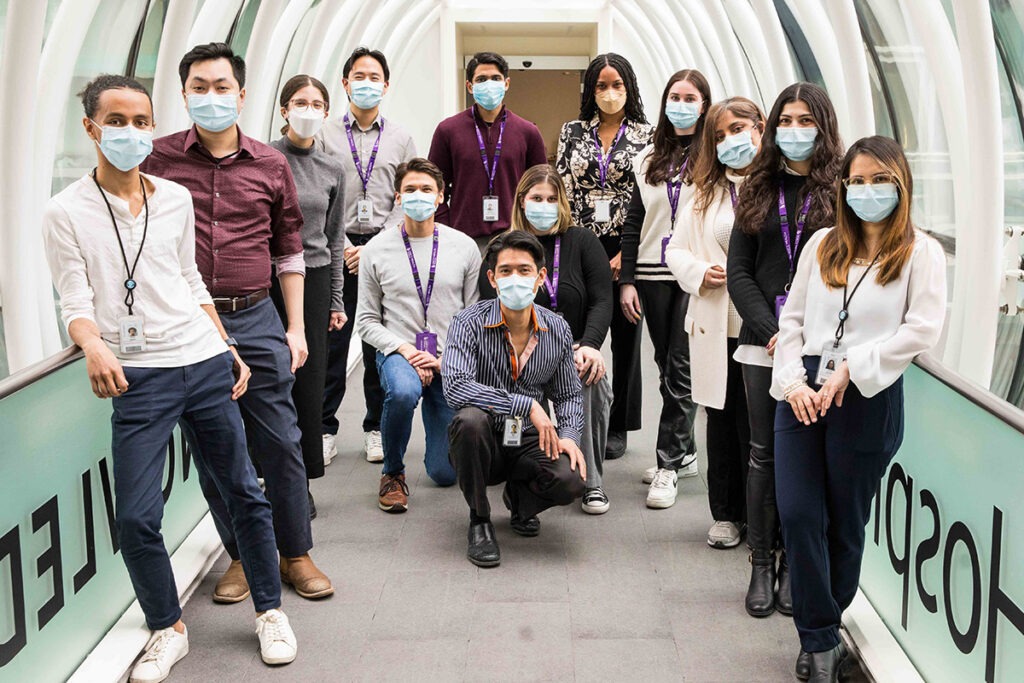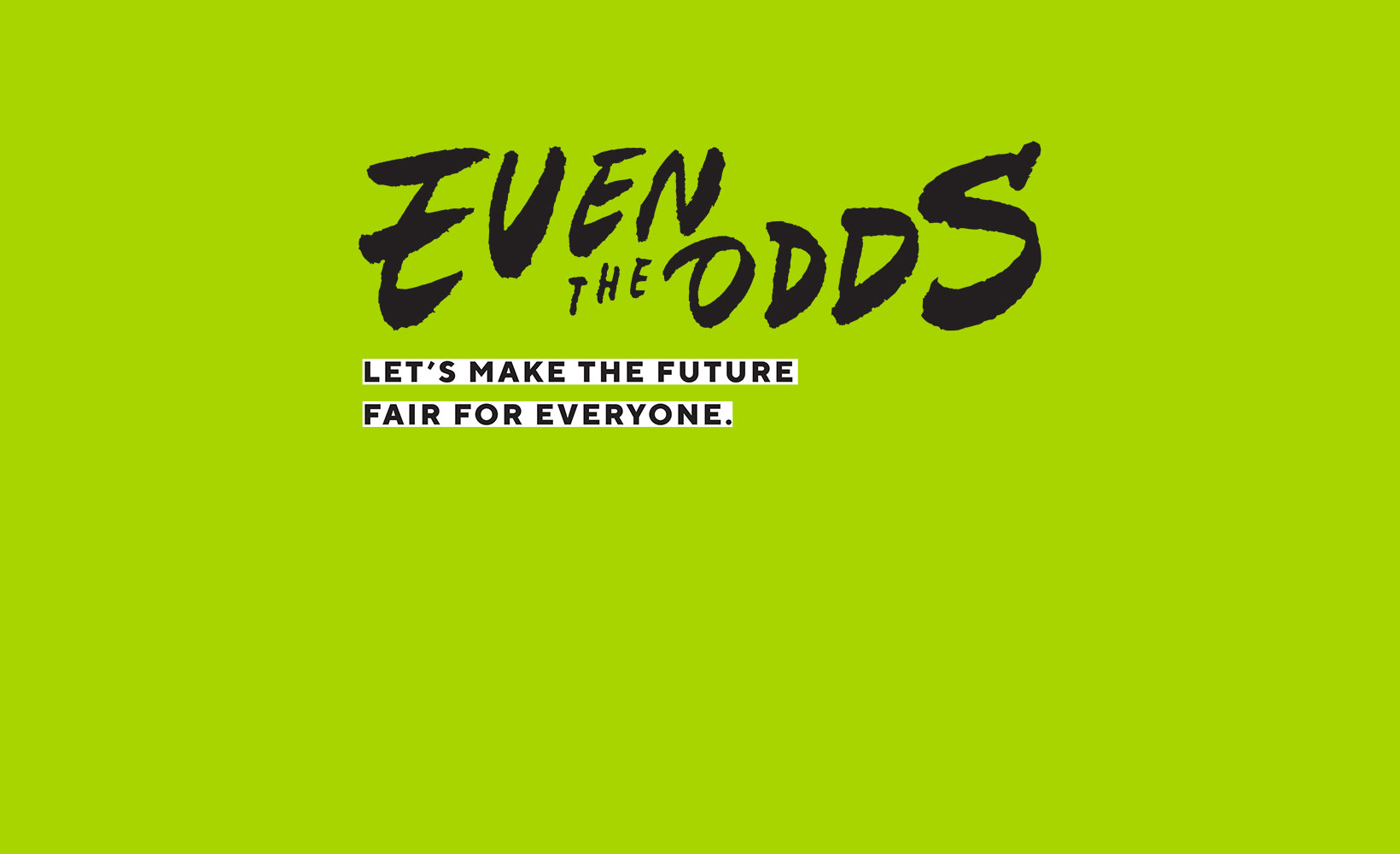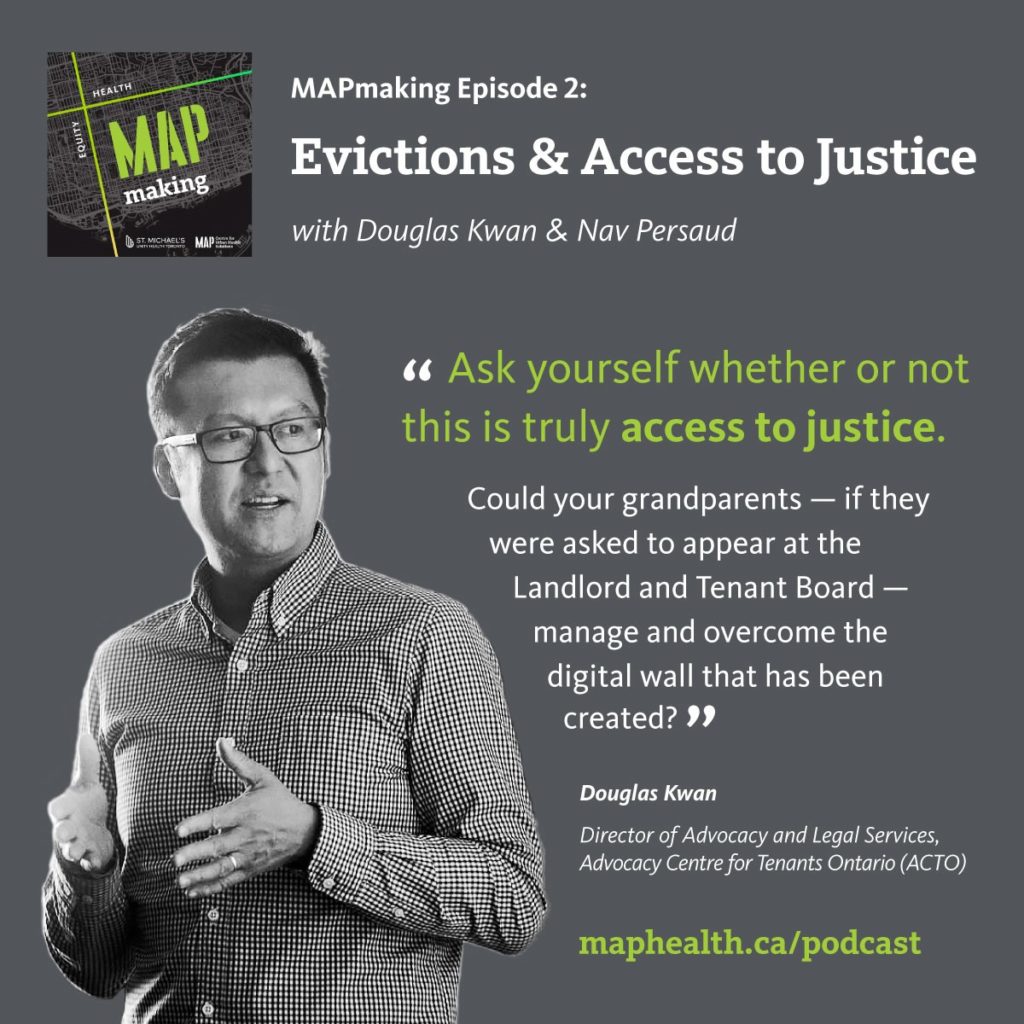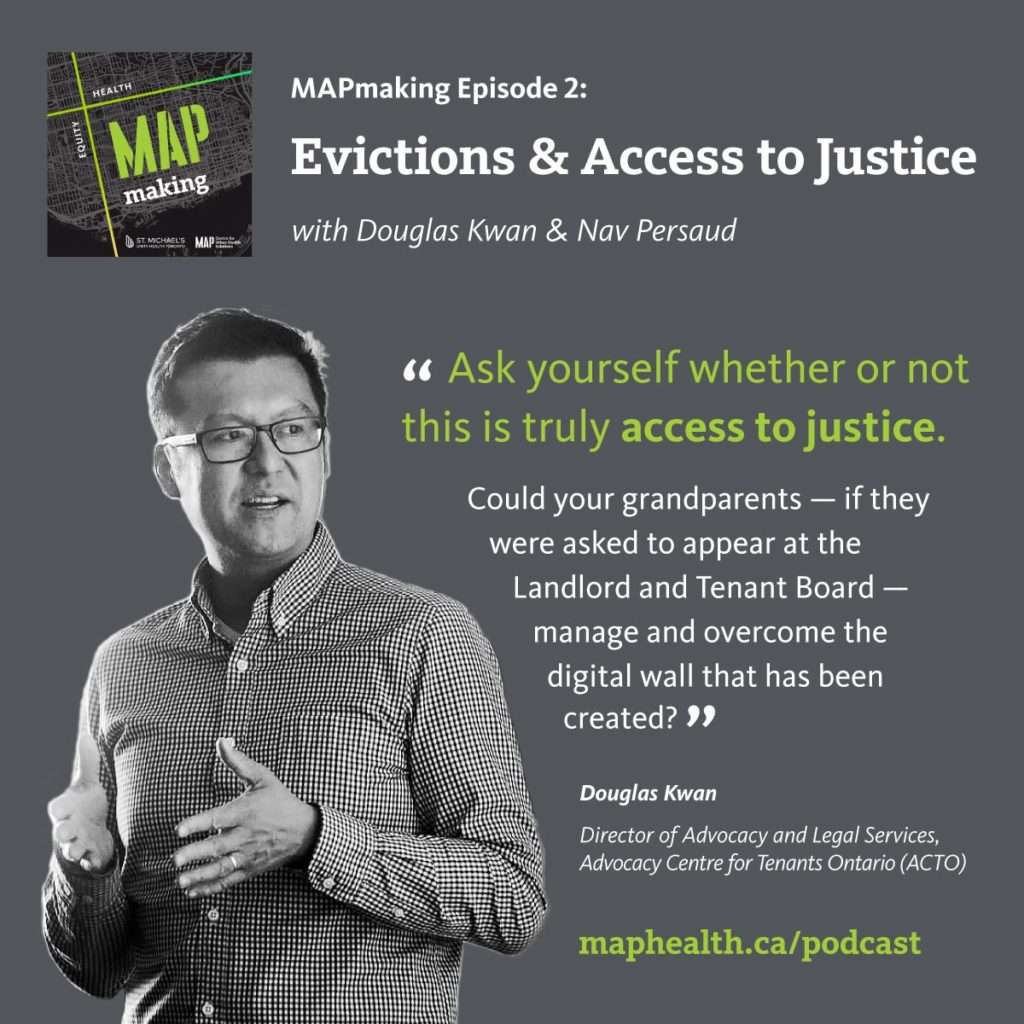Lire cet article en français
April 12, 2022 – Université de Montréal and the Centre de Recherche en Santé Publique (CReSP), supported by MAP and Staples Canada/Bureau en Gros through their Even the Odds initiative, is launching a research project to study an innovative health clinic specifically designed to meet the needs of racialized and migrant communities who identify as LGBTQI+.
The first of its kind in Quebec, ‘Clinic Mauve’ was launched in Montréal in 2020 through an initial grant from the Foundation for Advancing Family Medicine of the College of Family Physicians of Canada. Led by Dr. Vania Jimenez, Dr. Pierre-Paul Tellier and Dr. Edward Lee, in close collaboration with community partner AGIR (a by and for LGBTQI+ migrant community organization), Clinic Mauve operates within a family medicine group at the Health and Social Service Centres of Côte-des-Neiges and Parc-Extension, and the Actuel medical clinic.
Despite Canada’s universal health care system, migrant and racialized people who are LGBTQI+ face multiple structural and intersecting barriers to accessing and benefiting from health care. These inequities were highlighted and exacerbated by the sudden arrival of COVID-19 in the spring of 2020.
Clinic Mauve delivers integrated medical care and psycho-social services (including social workers, therapists, and peer navigators) that engage in trauma-informed, anti-oppressive, and intersectional approaches tailored to meet the health needs of migrant and racialized populations who are LGBTQI+.
“We know that the Clinic Mauve is a very promising model of integrated care,” said Dr. Edward Lee, Associate Professor in the School of Social Work at Université de Montréal, a member of CReSP and the study’s lead researcher. “We’re launching this study to help us understand the aspects of the clinic that are most effective, and how we can scale up and share successful strategies with other care providers and communities across Canada.”
As part of the research project, the Université de Montréal team is collaborating with ongoing ‘Trans Indigenous Youth Social Action Research Sharing Circle’, a project led by Dr. Annie Pullen Sansfaçon and funded by SSHRC and in partnership with the organization P10, to explore the best ways to tailor the clinic’s services to serve Two-Spirit and/or trans Indigenous people, especially youth.
The research is funded by Even the Odds, a partnership between Staples Canada/Bureau en Gros and MAP (Unity Health Toronto) to raise awareness of inequity in Canada and help build vibrant, healthy communities. To date, the initiative has raised more than $1.2 million with the generous support of Staples/Bureau en Gros customers, vendors and corporate donations.
“We’re proud to support this exciting innovation to take on structural challenges that migrant and racialized people who are LGBTQI+ face accessing health care in Quebec,” said David Boone, CEO, Staples Canada/Bureau en Gros. “It’s a great model with the potential to scale and help ‘Even the Odds’ across Canada.”
Université de Montréal
Deeply rooted in Montreal and dedicated to its international mission, Université de Montréal ranks among the world’s top universities, placing 73rd in the Times Higher Education rankings. Founded in 1878, UdeM and its two affiliated schools, HEC Montréal and Polytechnique Montréal, constitute the largest centre of higher education and research in Quebec and one of the most important in North America. It has more than 2,300 professors and researchers, and nearly 70,000 students. For more information, visit umontreal.ca.
CReSP
The Centre for Public Health Research (CReSP) is the result of a partnership between the Université de Montréal and the CIUSSS du Centre-Sud-de-l’Île-de-Montréal, an integrated university health and social services centre. The CReSP is funded by the Fonds de recherche du Québec – Santé, and it brings together more than 60 researchers from six faculties of the University of Montréal and Polytechnique Montréal. Its mission is to generate relevant cutting-edge knowledge to provide insight into population health issues and support evidence-based public health initiatives to promote health and reduce the burden of illness. For more information, visit cresp.ca.
MAP
MAP is a world-leading research centre dedicated to creating a healthier future for all. Through big-picture research and street-level solutions, MAP scientists tackle complex community health issues—many at the intersection of health and equity. MAP’s 32 scientists and over 120 staff and students work in partnership with communities, researchers, and government leaders across Canada to address issues such as homelessness, unequal access to health care and medicine, and the lifelong effects of childhood poverty. MAP is part of the Li Ka Shing Knowledge Institute of St. Michael’s Hospital, Unity Health Toronto. For more information, visit maphealth.ca.
Staples Canada
Staples Canada/Bureau en Gros is The Working and Learning Company. With a focus on community, inspiration and services, the privately-owned company is committed to being a dynamic, inspiring partner to customers who visit its over 300 locations and staples.ca. The company has two brands that support business customers, Staples Preferred for small businesses and Staples Professional for medium to large-sized enterprises, as well as five co-working facilities in Toronto, Kelowna, Oakville and Ottawa under the banner Staples Studio. Staples Canada is a proud partner of MAP through its Even the Odds campaign, which aims to tackle inequities in communities across Canada and helps make a future that’s fair for everyone. Visit staples.ca for more information or get social with @StaplesCanada on Facebook, Twitter, Instagram and LinkedIn.
Jeff Heinrich
Press attaché – Foreign & English
Université de Montréal,
Tel.: 514-343-7593
jeff.heinrich@umontreal.ca
Kathleen Stelmach
Manager, PR and Communications
Staples Canada/Bureau en Gros
Tel. : 905 737-1147 Ext. 578
kathleen.stelmach@staples.ca
Un projet québécois fait tomber les obstacles aux soins de santé pour les populations LGBTQI+ migrantes et racisées
12 avril 2022 – L’Université de Montréal et le Centre de recherche en santé publique (CReSP), soutenus par le MAP et par Staples Canada/Bureau en Gros dans le cadre de leur initiative À chance égale, lancent un projet de recherche qui évaluera une clinique de santé novatrice spécialement conçue pour répondre aux besoins des communautés migrantes et racisées qui s’identifient comme étant membres des communautés LGBTQI+.
Première du genre au Québec, la « Clinique Mauve » a été lancée à Montréal en 2020 grâce à une subvention originale de la Fondation pour l’avancement de la médecine familiale du Collège des médecins de famille du Canada. Dirigée par les professeur.e.s Vania Jimenez, Pierre-Paul Tellier et Edward Lee, en étroite collaboration avec le partenaire communautaire AGIR (un organisme communautaire par et pour les personnes LGBTQI+ migrantes) la Clinique Mauve fonctionne au sein d’un groupe de médecine familiale des Centres de santé et de services sociaux de Côte-des-Neiges et Parc-Extension, et de la clinique médicale l’Actuel.
En dépit de la couverture universelle du système de santé canadien, les personnes migrantes et racisées membres des communautés LGBTQI+ font face à de multiples obstacles structurels et intersectionnels lorsqu’il s’agit d’accéder aux soins de santé et d’en bénéficier. Ces inégalités ont été mises en évidence et accentuées par l’arrivée soudaine de la COVID-19 au printemps 2020.
La Clinique Mauve propose des soins médicaux intégrés et des services psychosociaux (notamment au moyen d’équipes de travail social, de services en santé mentale et de paire navigation) qui adoptent des approches anti-oppressives, intersectionnelles et sensibles aux traumatismes. Ces approches visent à mieux répondre aux besoins de santé des populations migrantes et racisées qui sont membres des communautés LGBTQI+.
« Nous savons que la Clinique Mauve représente un modèle très prometteur de soins intégrés », a déclaré Edward Lee, professeur agrégé à l’École de travail social de l’Université de Montréal, membre du CReSP et chercheur principal de l’étude. « Nous lançons cette étude pour nous aider à comprendre les éléments de la clinique qui sont les plus efficaces, et comment nous pouvons les transposer à plus grande échelle et partager les stratégies efficaces avec d’autres milieux de pratique et communautés à l’échelle du Canada. »
Dans le cadre du projet de recherche, l’équipe de l’Université de Montréal collabore avec le « Trans Indigenous Youth Social Action Research Sharing Circle », un projet dirigé par la professeure Annie Pullen Sansfaçon, financé par le CRSH et en partenariat avec l’organisme P10, afin d’explorer les meilleures façons d’adapter les services de la clinique pour servir les personnes Autochtones bispirituelles et/ou trans, en particulier les jeunes.
Cette recherche est financée par À chance égale, un partenariat entre Staples Canada/Bureau en Gros et le MAP (Unity Health Toronto) visant à sensibiliser la population aux inégalités au Canada et à contribuer à la création de communautés dynamiques et saines. À ce jour, l’initiative a permis de recueillir plus de 1,2 million de dollars grâce au soutien généreux des client.e.s, des vendeur.euse.s de Staples/Bureau en Gros, et de dons d’entreprises.
« Nous sommes fiers de soutenir cette formidable initiative visant à relever les défis structurels pour accéder aux soins de santé au Québec auxquels font face les personnes migrantes et les personnes racisées LGBTQI+ », a déclaré David Boone, PDG de Staples Canada/Bureau en Gros. « Il s’agit d’un excellent modèle qui a le potentiel de s’étendre et de donner à toutes et à tous une chance égale de s’épanouir ».
Université de Montréal
Montréalaise par ses racines, internationale par vocation, l’Université de Montréal compte parmi les meilleures universités au monde. Elle se classe au 73e rang du classement du Times Higher Education. Elle a été fondée en 1878 et forme aujourd’hui avec ses deux écoles affiliées, HEC Montréal et Polytechnique Montréal, le premier pôle d’enseignement supérieur et de recherche du Québec et l’un des plus importants en Amérique du Nord. L’Université de Montréal réunit plus de 2300 professeur.e.s et chercheur.e.s et accueille près de 70 000 étudiant.e.s. Pour en savoir plus, visitez umontreal.ca
Centre de recherche en santé publique (CReSP)
Issu d’un partenariat entre le CIUSSS du Centre-Sud-de-l’Île-de-Montréal (CCSMTL) et l’Université de Montréal, le Centre de recherche en santé publique (CReSP) est la première et la seule infrastructure majeure de recherche québécoise entièrement dédiée à la santé publique et opérant dans le cadre de liens structurels privilégiés avec un établissement responsable de la santé d’une population, le CCSMTL. Le CReSP est un regroupement de recherche financé par le Fonds de recherche du Québec – Santé (FRQS) qui compte plus de 60 membres chercheur.e.s régulier.e.s et des expert.e.s provenant d’organisations partenaires. Pour en savoir plus, visitez cresp.ca.
MAP
Le MAP est un centre de recherche de premier plan au niveau mondial, qui se consacre à la création d’un avenir plus sain pour tous. Grâce à des recherches d’envergure et à des solutions concrètes, les scientifiques du MAP s’attaquent à des enjeux complexes de santé communautaire, souvent à la croisée de la santé et de l’équité. Les 32 scientifiques et plus de 120 employé.e.s et étudiant.e.s du MAP travaillent en partenariat avec des communautés, des chercheur.e.s et des dirigeant.e.s gouvernementaux.ales dans tout le Canada pour s’attaquer à des problèmes tels que l’itinérance, l’accès inégal aux soins de santé et à la médecine, et les effets permanents dus à la pauvreté des enfants. Le MAP relève de l’Institut du savoir Li Ka Shing de l’hôpital St. Michael, Unity Health Toronto. Pour en savoir plus, visitez maphealth.ca.
Staples Canada/Bureau en Gros
Staples Canada/Bureau en Gros est l’Entreprise du travail et de l’apprentissage. En mettant l’accent sur la collectivité, l’inspiration et les services, la société privée est déterminée à jouer le rôle de partenaire dynamique et inspirant pour tous les clients qui visitent ses quelque 300 succursales et le site bureauengros.com. L’entreprise possède deux sous-marques qui soutiennent ses clients commerciaux – Bureau en Gros Privilège pour les petites entreprises et Staples Professionnel pour les moyennes et grandes entreprises – ainsi que cinq studios de travail partagé à Toronto, Kelowna, Oakville et Ottawa sous la bannière Staples Studio. Staples Canada/Bureau en Gros est fier de travailler en partenariat avec le Centre MAP dans le cadre de sa campagne À chance égale, qui vise à s’attaquer aux inégalités dans les collectivités partout au Canada et à créer un avenir équitable pour tous. Consultez bureauengros.com pour en savoir plus ou suivez @BureauenGros sur Facebook, Twitter et Instagram.
Julie Gazaille
Attachée de presse – médias francophones
Université de Montréal
514-343-6796 | j.cordeau-gazaille@umontreal.ca
Kathleen Stelmach
Manager, PR and Communications
Staples Canada/Bureau en Gros
Tel. : 905 737-1147 Ext. 578
kathleen.stelmach@staples.ca






